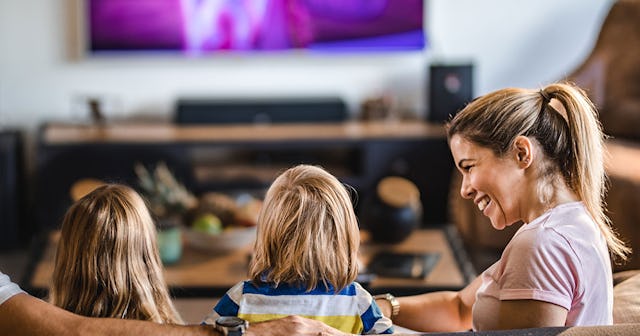Why You Should Talk To Your Kids While They're Watching TV

You don’t have to be living under a rock to know that screen time is a hot-button topic for parents.
First, there’s the parental guilt. Then there’s the parent-shaming. According to the American Academy of Child & Adolescent Psychology, littles (ages 18 months to 5 years) should ideally have no screen time. But if they do, only up to 1 hour per weekday of non-educational content. And yes, these were pre-pandemic numbers. Those kinds of limits on TV time don’t sound overly realistic … even in a perfect world.
But there’s a new study out on ScienceDaily featuring research from Michigan Medicine, the data of which suggests talking to preschoolers during TV time inspires their curiosity, which helps negate some of the “negative” effects of TV time. Here’s what that means.
Conversation During TV Time Piques Curiosity
The primary author of this research, developmental and behavioral pediatrician Prachi Shah, says, “Curiosity is an important foundation for scientific innovation, joy in learning, and positive childhood outcomes.”
Think about it: When you’re curious about something what do you do? You delve head first into the subject and then proceed to follow it to the deepest, darkest, black holes of the internet.
In turn, when you talk to your kiddo about what they’re watching, it will inspire their curiosity about the content. Shah says the research supports this finding: “We know frequent parent-child conversation promotes several areas of early child development, including a child’s curiosity.” So, if your little is watching “Bluey” for the one millionth time, ask them about it. Even though they might not have all the answers to your questions, it gives them something to think about.
Many of the storylines in the shows our preschoolers love involve basic conflicts and problem-solving skills. Now of course in real life, the problems they may come across might not have such simple answers. But talking through the scenarios with our kids helps them conceptualize and imagine how they can use these same skills. Shoutout to Daniel Tiger, because buddy, you helped my girls understand the importance of “counting to four before you roar.”
We all know there is a difference between education and learning. When kids can put what they see and hear into action, the lessons stick better, compared to memorizing and regurgitating information. This includes what they see and hear during screen and TV time.
Curiosity Is Linked to Enhanced Learning
Teachthought.com gives us a few different ideas of how we can cultivate curiosity with our kids at home. Yes, even when we’re watching TV together. A few ways you can do this are as simple as modeling curiosity and letting your kids guide the conversation. When you watch a program together, casually talking to your kids about the why behind the character’s choices and actions is a great way to model curiosity. Basically, just think out loud. And if this ends up with your kiddos going off on a tangent related to the content, even better. Letting kids guide the conversations and actively involve them in their learning cultivates incredible space for curiosity to flourish.
Of course, this is all great in theory. But sometimes, the entire reason for unplanned TV time is because we need a break from the million and two questions our littles have. There are groceries to be put away, dinner to be made, and bills to be paid. We totally get it. Of course, not all parents can sit and watch TV with their kids; it does require a certain amount of privilege. Either way, there’s no shame in that. The moral here is that screen time doesn’t have to be all bad.
So don’t feel guilty if you give your kiddo a little extra TV time to save you from losing your mind. But at bedtime, try taking a moment and ask them about what they were watching and what they learned from it. Remember, always stay curious.
This article was originally published on